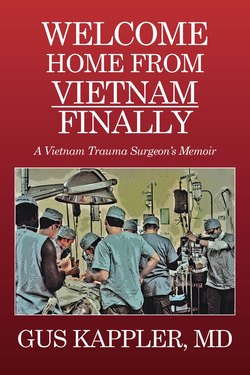Читать книгу Welcome Home From Vietnam, Finally - Gus Kappler MD - Страница 5
На сайте Литреса книга снята с продажи.
ОглавлениеPREFACE
Usually authors write about their life experiences within a few years of the occurrence. Facts are still fresh in one’s mind, new projects have not become more primary, and the inertia of procrastination has not gained a foothold. Why did I wait over forty-five years?
I guess the most dominant reason I did not commit to telling my story was that I would not prioritize writing above other aspects of my existence. Those factors included building and maintaining a solo surgical practice, preserving quality time to be an acceptable husband and father, enjoying my personal time to recharge, planning for retirement, and facilitating first-year medical students in a problem-based learning curriculum at Weill Cornell Medical College after retiring.
In 2015, the facilitating responsibility became history. The 2014–2015 winter in New York City did not welcome one to venture outside. I had also completed my computer projects. At age seventy-five, I thought I better get started with my storytelling before my gray matter became too scarred with amyloid plaques.
I have been lecturing about my Vietnam experience since 1972. The discussion of “Battlefield Trauma: Vietnam to Afghanistan” has been annually sponsored by the Stimson Surgical Society at Weill Cornell Medical College. In September 2014, all members we could find of the 1970–1971 85th Evacuation Hospital family met for our fifth reunion. I felt primed. Most importantly, I now felt grown up and whole enough to tell my story. Here we go.
By the way, I took the great majority of this book’s photographs with my first good camera, a Minolta SRT 101.
Hippocratic Oath, Classic
“I will apply dietetic measures for the benefit of the sick according to my ability and judgment; I will keep them from harm and injustice.”
—From The Hippocratic Oath: Text, Translation, and Interpretation, by Ludwig Edelstein. Baltimore: Johns Hopkins Press, 1943.
In the 1960s, the Hippocratic Oath’s language was changed to reflect a more secular concept, accommodating a more modern society. As once required in Greece, this oath is not to be taken before God or any gods, but before only our contemporaries.
The phrase “do no harm” is not a part of the Hippocratic Oath.
Hippocratic Oath, Modern Version
“I will apply, for the benefit of the sick, all measures (that) are required avoiding those twin traps of over treatment and therapeutic nihilism.”
—Written in 1964 by Louis lasagna, Academic Dean of School of Medicine at Tufts University
The Question
Is the Hippocratic Oath rewritten in a combat zone when abiding by the moral code of war, not peace?
Is it intellectually honest for the public to apply and therefore judge a warrior’s actions by the moral code of peace, while safe at home, as that warrior is fighting to stay alive and living by the moral code of war: the concept of justified killing versus murder?
The fact is the warriors and treating physicians usually existed in a moral limbo, vacillating between both the moral codes of peace and war.
In Vietnam, when I triaged in the emergency department during a mass casualty, I condemned the very most seriously wounded, who may have been salvageable, to death by withholding treatment, for multiple lives could be saved by redistributing the many resources and manpower that would have been utilized on that one patient.
